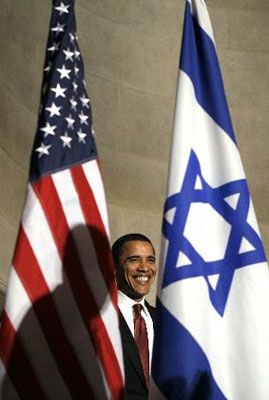Not long after the polls close in the May 20 Kentucky and Oregon primaries, Barack Obama plans to declare victory in his bid for the Democratic presidential nomination.
And, until at least May 31 and perhaps longer, Hillary Clinton's campaign plans to dispute it.
 US Democratic presidential candidate Senator Barack Obama (D-IL) smiles as he is introduced to speak during a reception celebrating the 60th anniversary of Israel in Washington May 8, 2008.
US Democratic presidential candidate Senator Barack Obama (D-IL) smiles as he is introduced to speak during a reception celebrating the 60th anniversary of Israel in Washington May 8, 2008.
It's a train wreck waiting to happen, with one candidate claiming to be the nominee while the other vigorously denies it, all predicated on an argument over what exactly constitutes the finish line of the primary race.
The Obama campaign agrees with the Democratic National Committee, which pegs a winning majority at 2,025 pledged delegates and superdelegates--a figure that excludes the penalized Florida and Michigan delegations. The Clinton campaign, on the other hand, insists the winner will need 2,209 to cinch the nomination--a tally that includes Florida and Michigan.
"We don't accept 2,025. It is not the real number because that does not include Florida and Michigan," said Howard Wolfson, one of Clinton's two chief strategists. "It's a phony number."
Wolfson said they intend to contest the DNC's 2,025 number "every day," as well as any declaration of victory made by Obama based upon that number, because it does not include Florida and Michigan.